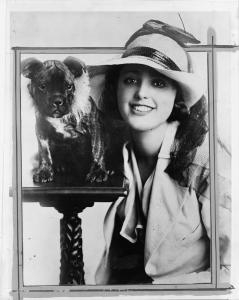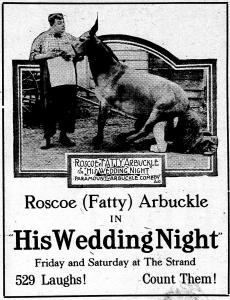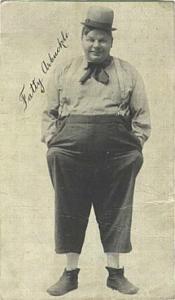Long before television catapulted Donald Trump and Matt Lauer to fame and notoriety, Roscoe “Fatty” Arbuckle was one of Hollywood’s biggest sensations. His silent film, Crazy to Marry (1921), was a hit across the country. Paramount quickly signed a contract with him worth $3 million, an outrageous amount of money at the time.

To celebrate, one of Arbuckle’s friends rented a block of hotel rooms in San Francisco to throw him a big party. There, in a horrific scene demonstrating that there really is nothing new under the sun, a flush-with-power Arbuckle became a sex predator. Virginia Rappe, a 30-year-old actress, was his victim. According to an article in Smithsonian Magazine, the assault looked like this: After Arbuckle and Rappe had had a few drinks together, he pulled the actress into an adjoining room, saying, “I’ve waited for you five years, and now I’ve got you.” Not long after, Rappe’s friend heard the actress screaming, so she knocked on and then kicked at the locked door. After a delay, Arbuckle came to the door in his pajamas, wearing Rappe’s hat “cocked at an angle” and smiling his “foolish screen smile.”
Rappe, sprawled on the bed behind him, moaned, “Arbuckle did it.” She was taken to another room, where a doctor attended to her. She eventually went to the hospital, where she died several days later of a ruptured bladder.
The news spread like wildfire. The publisher of the Hearst newspapers said that the scandal sold more copies than the sinking of the Lusitania. According to investigators and the news articles, the 266-pound star had raped her and then killed her when her bladder burst “under the weight of his fat body.”
Despite the allegations, Arbuckle went free. Two juries hung before a third acquitted him. The scandal, however, did launch a vociferous campaign against Hollywood. Some of his old films, like Life of the Party, which once had seemed so silly and innocuous, suddenly took on a grotesque light.

The allegations also exposed other Hollywood sins. According to historian Matt Sutton, author of the terrific book American Apocalypse, this particular bad boy may have “outflanked the rest in the race toward total moral degradation,” but there were many others. Charlie Chaplin was a notorious womanizer. Douglas Fairbanks and Mary Pickford had divorced their spouses and married each other.
America’s Christians in particular went ballistic. From his pulpit John Roach Straton, a Baptist pastor and radio preacher, delivered a scathing sermon entitled “Fatty Stands Before Nation with Leering Grin While His Hands Drip Blood.” The King’s Business, a publication of the Bible Institute of Los Angeles, sneered, “Given the moron audience and the moron picture, the moron actor and the moron director are inevitable.” Harold Ockenga, pastor of Boston’s Park Street Church, alleged that Jews had commandeered Hollywood and injected anti-Christian messages into movies. Others, according to Sutton, suggested “that a constitutional amendment against film would be ‘a righteous judgment against a wicked industry.’”

Frightened by fundamentalist fury, Hollywood executives hired Will Hays, a Presbyterian deacon who had successfully managed Warren Harding’s campaign for the presidency, to serve as the president of the Motion Picture Producers and Distributors of America. His task was to rehabilitate the moral image of Hollywood in the wake of the Arbuckle scandal. He did exactly that, demanding that production companies require their actors to sign morals clauses. Hays also issued guidelines called “The Production Code” to regulate film content. He reportedly told one movie director, “When you make a woman cross her legs in the films, maybe you don’t need to see how she can cross them and stay within the law; but how low she can cross them and still be interesting.”
Similar religious campaigns for “family values” persisted through the twentieth century. This was especially evident in the conservative evangelical activism against Bill Clinton’s bad behavior in the 1990s. But the shift a decade earlier from the pious Carter to Reagan, a divorced Hollywood actor who Vice President Mike Pence once called “a vacuous movie star,” was a harbinger of things to come, when a more pronounced pragmatism became the methodology of the religious right.
Persistent white evangelical support for Trump—and now for Roy Moore—shows just how much has changed since the 1920s. Indeed, much of this striking transformation has taken place in just the last five years. In 2011, only 30 percent of white evangelicals agreed that “an elected official who commits an immoral act in their personal life can still behave ethically and fulfill their duties.” Today, a full 72% do—a shift that shows just how political the term “evangelical” has become.













